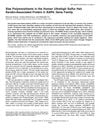The KRT84 gene is linked to better wool quality in Gansu Alpine Fine-wool sheep.
 2 citations,
August 2022 in “The journal of investigative dermatology/Journal of investigative dermatology”
2 citations,
August 2022 in “The journal of investigative dermatology/Journal of investigative dermatology” A specific mutation in the K25 gene causes a rare genetic disorder with curly hair at birth and later hair loss, along with dental issues.
 1 citations,
July 2023 in “Forensic science international. Genetics”
1 citations,
July 2023 in “Forensic science international. Genetics” Hair protein analysis might help identify a person's ethnicity, sex, and age in forensics.
 December 2024 in “Genome Biology and Evolution”
December 2024 in “Genome Biology and Evolution” Snakes and worm lizards lost claw proteins due to similar evolutionary changes.
 October 2024 in “Cosmetics”
October 2024 in “Cosmetics” Afro-textured hair needs personalized care due to its unique genetic traits.
 8 citations,
July 2011 in “Animal science journal”
8 citations,
July 2011 in “Animal science journal” Keratin 33A is a key protein in goat winter coats, especially in high-producing breeds.
 6 citations,
September 2015 in “Journal of Investigative Dermatology”
6 citations,
September 2015 in “Journal of Investigative Dermatology” Using special RNA to target a mutant gene fixed hair problems in mice.
 26 citations,
May 2014 in “BioEssays”
26 citations,
May 2014 in “BioEssays” Using neurohormones to control keratin can lead to new skin disease treatments.
17 citations,
May 2018 in “BMC genomics” Researchers found genes and microRNAs that control curly fleece in Chinese Tan sheep.
 September 2024 in “International Journal of Molecular Sciences”
September 2024 in “International Journal of Molecular Sciences” Hydrangea serrata extract may promote hair growth and improve hair health.
 48 citations,
July 1993 in “The journal of investigative dermatology/Journal of investigative dermatology”
48 citations,
July 1993 in “The journal of investigative dermatology/Journal of investigative dermatology” Hair growth is controlled by specific gene clusters and proteins, and cysteine affects hair gene expression in sheep.
64 citations,
March 2004 in “The journal of investigative dermatology/Journal of investigative dermatology” GPRC5D is linked to the formation of hair, nails, and certain tongue areas.
 27 citations,
June 2005 in “The journal of investigative dermatology/Journal of investigative dermatology”
27 citations,
June 2005 in “The journal of investigative dermatology/Journal of investigative dermatology” The study found that variations in hair protein genes are likely due to evolutionary deletions or duplications.
27 citations,
April 2018 in “Artificial Cells Nanomedicine and Biotechnology” Recombinant human hair keratin proteins can effectively stop bleeding.
 53 citations,
September 1999 in “The journal of cell biology/The Journal of cell biology”
53 citations,
September 1999 in “The journal of cell biology/The Journal of cell biology” K16 can partially replace K14 but causes hair loss and skin issues.
14 citations,
December 2016 in “PloS one” Keratin 26 affects cashmere goat hair growth and is influenced by various treatments.
 November 2023 in “Advanced Science”
November 2023 in “Advanced Science” A specific hair protein variant increases the spread of breast cancer and is linked to worse survival rates.
 13 citations,
April 2018 in “Scientific Reports”
13 citations,
April 2018 in “Scientific Reports” The genes KRT25 and SP6 affect curly hair in horses, with KRT25 also causing hair loss. If both genes are mutated, the horse gets curly hair and hair loss. KRT25 can hide the effect of SP6.
5 citations,
February 2007 in “Cytology and genetics” 517 citations,
February 2010 in “Materials” Keratin from hair and wool is used in medical materials for healing and drug delivery.
 5 citations,
November 2008 in “Advances in Dermatology”
5 citations,
November 2008 in “Advances in Dermatology” The review highlights the importance of stem cells in hair health and suggests new treatment strategies for hair loss conditions.
22 citations,
August 2015 in “PloS one” Keratin from hair binds well to gold and BMP-2, useful for bone repair.
 47 citations,
July 2004 in “Journal of Dermatological Science”
47 citations,
July 2004 in “Journal of Dermatological Science” Hair loss in balding individuals is linked to changes in specific hair growth-related genes.
 2 citations,
May 2023 in “Cancer medicine”
2 citations,
May 2023 in “Cancer medicine” KRT80 may worsen cancer by increasing growth and spread, but its full effects on treatment and outcomes need more research.
January 2025 in “International Journal of Molecular Sciences” Non-liganded Vitamin D Receptor is crucial for healthy skin and hair.
4 citations,
August 2020 in “Journal of proteomics” Hair protein composition is similar across different races and shapes.

Keratin hydrogels from human hair show promise for tissue engineering and regenerative medicine.
 December 2018 in “IntechOpen eBooks”
December 2018 in “IntechOpen eBooks” Neurohormones help control skin health and could treat skin disorders.
 41 citations,
June 2006 in “Journal of Investigative Dermatology”
41 citations,
June 2006 in “Journal of Investigative Dermatology” Beard and scalp hair cells have different gene expressions, which may affect beard growth characteristics.
1 citations,
January 1989 in “Springer eBooks”


















